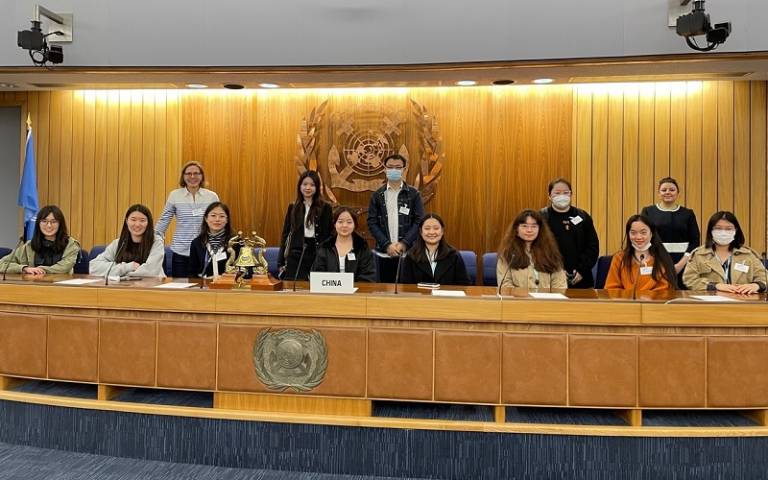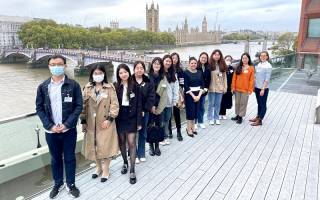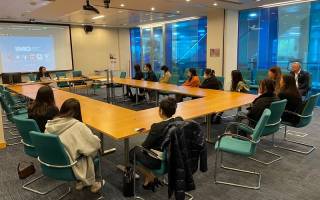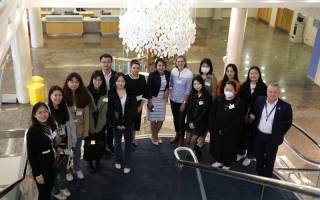UCL Student Visit to the International Maritime Organization
26 October 2022
Wuqian Yang reports on a recent study trip to the International Maritime Organization (IMO), involving a group of students from the MSc International Public Policy and MSc Global Governance and Ethics.

A dozen students from the MSc International Public Policy and MSc Global Governance and Ethics visited the International Maritime Organization (IMO) on 21 October 2022. This was an optional extra-curricular event organized by Dr. Inken von Borzyskowski (GGI Thematic Director) and Dr. Seebal Aboudounya (MSc IPP Deputy Director) at the UCL Department of Political Science. What follows is a report by one of our students, Ms. Wuqian Yang, and shared with her permission.
I felt very lucky to have gotten the chance to participate in the study trip to the International Maritime Organization (IMO) and I would like to share what I have seen and learned. The IMO is a specialized agency of the United Nations and its headquarters are in London. It is an organization dedicated to improving the safety of ships at sea and preventing marine pollution.

The IMO is conveniently located, close to Lambeth Palace and only across the river from Big Ben and Parliament. The inside of the IMO building is also very impressive. There are great models of super tankers in the entrance hall, donated by various countries, and a gigantic chandelier with ingenious design. We also got a chance to visit two main meeting rooms, where important intergovernmental conferences take place.
The most rewarding part of the trip for me was to listen to a presentation about the IMO by Ms. Galuh Rarasanti, the Senior Maritime Advisor at the Executive Office of the Secretary General. Ms. Rarasanti is originally an Indonesian diplomatic delegate working at the IMO. Her speech introduced us to the work and membership structure of the IMO. The IMO currently has 175 member states and 3 associated members. This means that most UN member states are also members of the IMO, with the exception of a few landlocked countries. Since its establishment, the IMO has developed a comprehensive regulatory framework, including more than 50 international conventions and agreements on maritime safety, security, environmental concerns (such as oil spills) and other issues.

For me, what stood out most was the Q&A, during which Ms. Rarasanti identified climate change as one of the most difficult topics to reach consensus on. Shipping by sea carries 80% of the world’s trade in goods and is the source of almost 3% of total greenhouse gas (GHG) emissions. Emissions from shipping are projected to increase significantly over the next three decades. The IMO has developed an initial strategy to reduce GHG emissions from international maritime shipping. However, this strategy is only a first step (it is due for revision in 2023) and its targets are not yet aligned with the Paris Agreement on climate change. Implementation will also be a key challenge. This is because the legal authority and responsibility to deal with transnational challenges still belongs to domestic governments. Thus, although the IMO has unified goals and regulations on marine pollution and climate change, it is difficult to achieve these due to different norms and regulations in different countries.
Ms. Rarasanti also told us that as graduate students aspiring to work in government departments or international organizations, we should always "keep asking questions." In our work, we should have the enthusiasm to continue learning and the courage to not be afraid of making mistakes. As many of us were females and from Asia, she encouraged us to overcome shyness and communicate actively. I think these suggestions are very helpful. We should be braver, both as international students and as a potential future international organization workers, if we are to make a contribution to greater progress on promoting global collaboration and sustainable development.

For students interested in gaining experience in an international organization, the IMO offers research-based internships (where you can also observe the functioning and proceedings of a UN organization) and externships opportunities for short-term support and to gain workplace experience. Both are unpaid but quite attractive to students already in London.
 Close
Close


